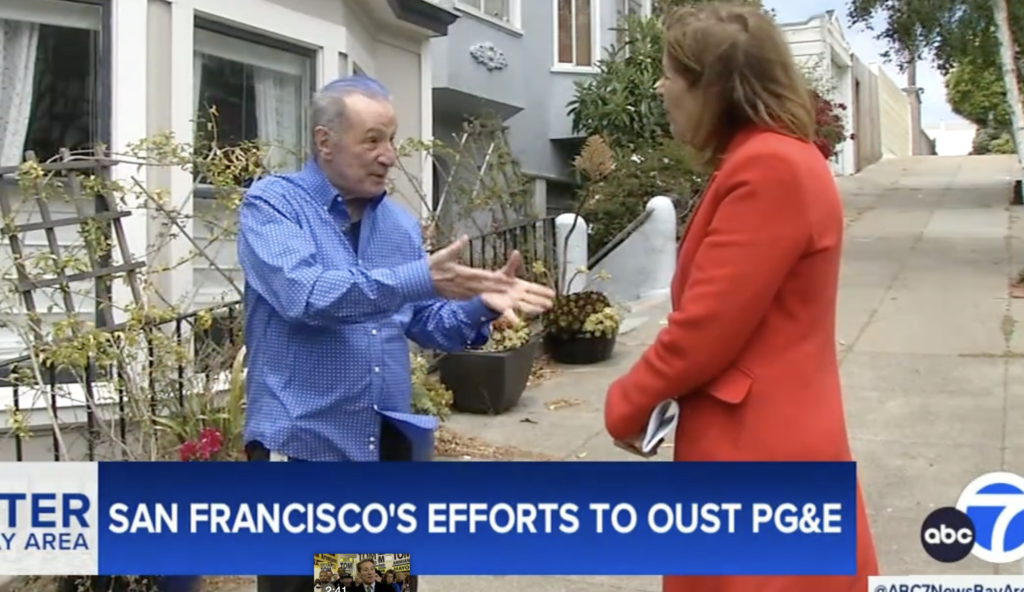I have been writing about PG&E and the Raker Act Scandal since I started working at the Bay Guardian in 1982. For more than four decades, the mainstream news media has ignored us, dismissed us, or taken the side of the illegal power monopoly. (The Bay Guardian first broke the story in 1969, long before I got there; I just kept it going.)
And now, after all the disasters that PG&E has wrought on the state and the city, we are starting to see a change.
Even the Chron, long a staunch supporter of PG&E, is catching on; in an editorial today, the paper chastised the state Legislature, including Assemblymember Matt Haney, for failing to control future rate hikes. Haney didn’t cast a vote on a bill that would have capped the monthly “fixed charge” that PG&E wants to stick us all with. That meant he voted to kill it. In other words, to side with PG&E.

Last week, the local ABC news affiliate did what is for TV a very detailed story about how PG&E has for more than a century blocked the federal mandate that San Francisco operate a public-power system. You can see the story by Lyanne Melendez here.
She points out the clear facts: San Francisco in 1913 won the right to build a dam in Hetch Hetchy Valley in Yosemite National Park to provide a stable water source for a growing city—but only on the condition that the dam also be used to generate hydroelectric power that would be used as a beach head for public power in Northern California.
That is: to undermine PG&E.
At the time, the conservationists who opposed the idea of a dam in a public park and the public-power advocates who argued that electricity, like water, should never be controlled by private companies, were willing to cut a compromise. It was an historic moment; destroy a pristine valley that broke John Muir’s heart, but keep an emerging private monopoly from controlling the local power grid.
It’s been a massive failure: For more than 100 years, PG&E has bought off politicians and sometimes community organizations, paid a fortune to run political campaigns and control local media, and do everything possible to protect its most lucrative market, San Francisco.
Help us save local journalism!
Every tax-deductible donation helps us grow to cover the issues that mean the most to our community. Become a 48 Hills Hero and support the only daily progressive news source in the Bay Area.
The company is also protecting a system that prevents the city—and the state—from taking real action on climate change. PG&E is making it more difficult for people to install rooftop solar, because that hurts the company’s profits. The reality is, one of the few effective ways to reach renewable energy goals in California is widespread, distributed generation—like rooftop solar.
A public-power system has no profit motive, so San Francisco could, and would, encourage more solar installations.
And under any scenario I can imagine, and I have run these numbers many times over the years, the city would wind up making money—hundreds of millions of dollars a year in revenue over costs by running a full-scale public-power system.
There is, and we will hear about this, the issue of what happens to the other parts of Northern California, where PG&E would still be the only power source, and would try to raise rates to make up for losing its most lucrative territory.
But there’s a ready-made solution to that, too: The state already has a framework in place to replace PG&E entirely. Alternately, the state could break up the giant company and parcel its grid out to existing agencies; the Sacramento Municipal Utility District could take much of the north, East Bay Mud could take the rest of the Bay Area … it’s not that difficult to imagine public power for all of Northern California.
So here’s what has to happen: PG&E has made it clear that the company won’t sell voluntarily, so the city has to take the grid by eminent domain. That means setting a price on everything the company owns in SF (except the headquarters building on Beale St., which the city doesn’t need or want).
The California Public Utilities Commission is working on putting a value to the lines, poles, meters, etc.—and as soon as that figure is ready, the SF Public Utilities Commission would have to go into court and file the papers to take over the system.
There’s no need to go to the ballot to approve a bond act; the PUC has the authority, thanks to a measure years ago by Sup. Aaron Peskin, to issue revenue bonds, backed not by the city’s tax base but by the future income from the system.
At some point along the way, either the controller or the budget analyst would need to run the numbers, to show the public (and Wall Street) that this makes financial sense. It’s never too early to get that started.
Breed supports the idea. Peskin, of course, does too. Sup. Ahsha Safai has supported it in the past.
I have asked the other two major candidates for mayor, Mark Farrell and Daniel Lurie, for their response, and will let you know what they say.
I’ve given Haney two days to explain his pro-PG&E stance. I’ve call his director of communications, Nate Allbee, twice and left a text message.
No response.



